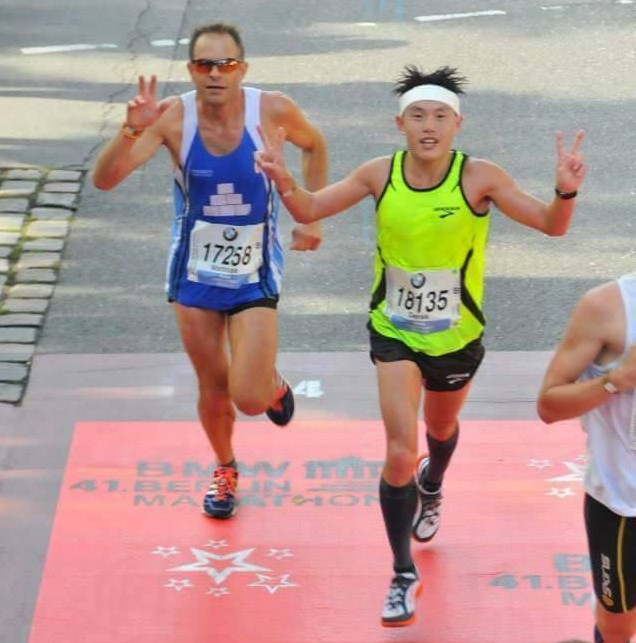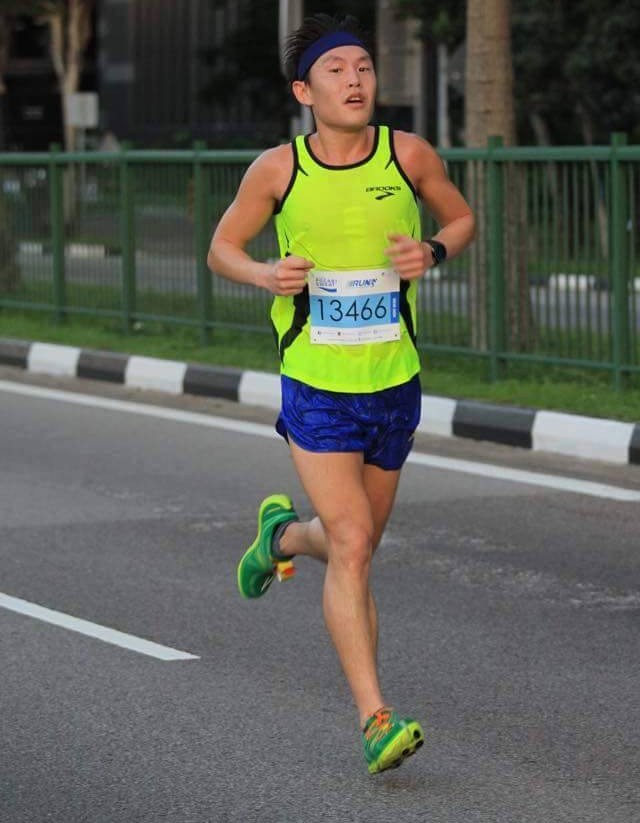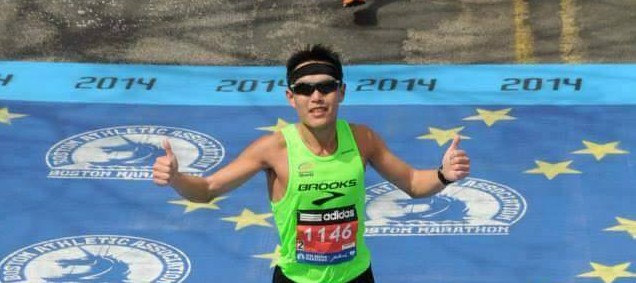With a busy schedule as a doctor, this does not keep Derek Li from becoming one of the top marathoners and most well-known names among the running community in Singapore. Flight Centre Active Travel chats with Derek on his life as a “running doctor”.
FC Active Travel: Hi Derek! Thank you for agreeing to do this interview with Flight Centre Active Travel Singapore. The running community might know you as one of the top marathoners in Singapore, but what they might not realize is that you also work as a doctor! Tell us a little about how you fit training into your daily schedule, and the challenges you face as a “running doctor”.
Derek: A few years back when I was still working in the government hospitals, it was certainly harder to train, because working hours were erratic and my on-call days meant that I had to miss training at least 1-2 days a week. When I made the decision to leave the public sector, having a more predictable work schedule that allows for more consistent training was part of the reason.
I’m currently a family physician with a private GP group, so I have relatively fixed working hours, and that allows me to schedule my runs before and after my work. I also negotiated with my employer to allow me to work afternoons and evenings instead of the usual 8-5 fare, and that makes it easier for me to get in up to two training sessions as day. I currently work 12:30pm-9:30pm most days. Part of my contract involves working every Sunday, though, and that makes it a bit tedious, especially if I have an early Sunday morning race.
Normally I make sure my Sunday workouts are lighter so I am fresher for work; Sundays are my busiest work day. Another downside to my work hours is that I am seldom able to join group training sessions as those are often held on weekday evenings. As such, almost all my running is done alone. Every once in a while, both worlds do collide, and I get people who come to see me for sports/running-related ailments. While I am reasonably confident of managing the simple injuries, I am mindful that I am not formally trained as a sports medicine specialist, and so managing expectations can be a little tricky at times. I think one of the strangest encounters was when a patient told me he followed my Instagram feed at the end of the consultation.
FC Active Travel: We noticed that you are scheduled to race the Tokyo Marathon in Feb 2016! That is really exciting. What are your goals for that race and how are you preparing for them? Any reason why you picked Tokyo over the many other marathons on the calendar?
Derek: I generally enjoy the atmosphere of the major marathons. Perhaps I have been somewhat spoilt by the atmosphere of Boston when I ran there in the aftermath of the bombings. I had failed to get into the Tokyo marathon in both 2014 and 2015 by the general entry ballot and 2016 is the first time they have included a sort of semi-elite category for foreigners and I was fortunate enough to get a spot.
I am also keen to run Tokyo because it is historically a cold race in the 0-10deg Celsius range, and that suits me very well. The timing of Tokyo isn’t all that ideal, as I would prefer an April race, but there are actually pretty few cold races in April. I would probably start training in December for it, as I’m getting married in November, so that gives me about 12 weeks to get in shape, which is just about enough I think. I also plan on doing NYC in 2016 if I can, but that’s a slow course so all my PB eggs will hinge on Tokyo for next year.
FC Active Travel: Where did you set your personal best in the marathon and which race did you do it at? Tell us about that race experience and the factors that combined to produce that great performance.
Derek: I set my personal best at the 2014 Boston Marathon. That race will always be remembered as the year after the Boston Marathon bombings, and the year Meb won it and the race itself was extremely charged with emotion. I managed to get the BQ with a 2:47 at the 2013 Gold Coast Marathon in July, but before Boston in April 2014, I also did the 2013 SCMS in December and the 2014 Dubai marathon in January. That left me about three months to get ready for Boston. I admit I was a little rushed for time! Dubai was a sort of rebound race as the SCMS did not go well, and I signed up for Dubai on a whim and did 2:47 again off about 4 weeks training, and got a 7s PB there.
Training had gone reasonably well, though I picked up a left hamstring strain in January, that would eventually dog me for over a year, but I was feeling pretty damned invincible by the time race day rocked around. The Boston race itself was quite an experience. My family went up with me and we arrived a week early and stayed on a week after the race. The first couple of days were crazy cold and windy; I was wearing a raincoat to run and tucked my hands in the pockets during my taper runs. The Wednesday before race day, it was so windy in the finishing straight that I saw a bus rocking in the wind as it halted at a traffic junction. The race expo was huge, and took me nearly six hours to cover all the stalls. Fortunately it warmed up by race day, maybe even a bit too much as a got a horrible sun tan on my shoulders and my forehead where my headband had been.
My race was an exercise in patience. With a rolling course, it’s difficult to go by a set target pace, so I ran mostly by feel and kept my breathing easy all the way until the 34km mark when I had crested the last big hill on the course. The crowd was absolutely mental in some parts of the course and I found myself subconsciously running faster than warranted at some points and had to consciously slow down. Unfortunately, I totally missed the famous Wellesley girls along the course and never got any love from them. I had hit the halfway mark in 1:20ish so I knew then that my initial goal of 2:40 was out of the question as the second half at Boston is much harder and net uphill. After the last big hill, I got a little carried away and starting winding it up a little early and bombed down the hill with a 3:35 lap split. I paid for it later on as I started tying up from km 39 onwards and I just barely had enough juice left to make it look respectable in the last couple of hundred metres to the finish line.
All in all, I was very satisfied with my time, as I only had a +1:40ish differential between the first and second halves considering the differing difficulty. In my mind, I paced it almost perfectly, and I think it will take something special to beat that performance.

FC Active Travel: Has your medical background helped you plan your training schedule or nutritional needs in any way? Do you have any tips for factors that are sometimes overlooked (eg. Fueling for training needs, importance of iron, etc.)
Derek: In a way, yes, because we do learn some basic nutritional science in university, and I did do some exercise physiology modules during my pre-clinical studies. In terms of how it molds my training, well, I guess I understand why we need to train at different zones to develop different types of systems for example. For example, the bulk of our body’s sugar stores (glycogen) are not in our muscles, but in our liver, and the average person has about 300kCal of that in the liver (a little more if you are well trained) and hence there is a need to continually fuel yourself during a marathon which is done at essentially a fine line between fat-burning and sugar-burning intensities, and why a negative split strategy might work better than an even split or even positive split strategy. I tend to do my morning runs on an empty stomach (I do drink lots of water) to try to make my body more efficient at burning fats, and I think it does help with my long run fitness a little.
In terms of fueling, I recommend getting in regular meals every day. If you have erratic meal times, then there will be big swings in your body’s sugar levels, and the body responds by raising its stress hormones and that can affect your weight, and your ability to train.
Iron is an interesting topic. In medicine, we test for iron deficiency by testing blood iron levels, transferrin levels, and TIBC (total iron binding capacity). We never rely on Ferritin, because Ferritin levels fluctuate in response to inflammation (guess what? Exercise is pro-inflammatory). Transferrin is a protein in the blood that carries iron around and TIBC is the capacity for Transferrin to carry iron. Think of Transferrin as a bus. Each bus can carry e.g. 20 iron passengers. If your buses are full, TIBC will be low, so you are not iron-deficient. If your buses are near empty, then TIBC will be high and you need supplements. Simple right? Strangely, when you look at what elite athletes are testing and what they talk about when they want to supplement iron, they are always talking about Ferritin, and Ferritin only. Very strange. I can’t explain it.
Another issue is that athletes may not be iron-deficient at all, and it is believed that because athletes have a higher blood volume (which is an adaptive result of exercise called plasma expansion), this has a dilutional effect on the numbers and makes it appear as though you are iron-deficient but really aren’t. Here’s an example. If you have 1 litre of blood and 100 units of iron, your blood iron level is 100U/l. But if your blood volume increases 10%, You have 1.1litres of blood and still only 100 units of Iron, then your blood iron level becomes 100/1.1 = 90.9U/l, so it looks like your iron levels went down. Here’s something else. Iron only serves to build red blood cells. If your red blood cells aren’t low, would it even matter if your blood levels showed low iron? Iron on its own has no effect on energy levels or fitness. So if you are concerned about iron levels, the first thing you should ask is “am I anaemic?” If your red cell numbers are healthy, then there is no need to check your iron levels are all.
I don’t take any supplements on a regular basis by the way. I probably should take glucosamine but I have very poor compliance.

FC Active Travel: As an athlete facing the demands of working life in Singapore? What is your training philosophy like? How should athletes in Singapore adapt their training programmes to best achieve a good training-work balance?
Derek: I am a big fan of the Lydiard method. I sort of did it by accident when I trained for the 2013 Gold Coast marathon, doing 7 weeks of volume without speed work and a longest run of only 24km, and I responded very well to it. I’ve since refined it a little to include some speed work at the tail end of the training cycle but my philosophy is simple. Run far, run often, and don’t get into oxygen debt. Do this for long enough, and the fitness will come.
As for achieving a work-life balance, I think the first thing is to decide for yourself how important this is to you. Is your aim just exercising to stay healthy, or to complete a particular race distance, or do you want to be as close to your physical potential as possible. Once you have decided, then comes the tricky part: accepting that different goals require different levels of sacrifice. Exercising for health is the easiest. Medical evidence advocates 30mins of light exercise five times a week as an absolute minimum to maintain health. If you want to finish a particular race distance, then the requirements may be more than that.
Everyone has the same 24 hours to play with, and sometimes it is as simple as being very organized with your time to squeeze out that extra bit of time to get more training in. I know people who wake up at 4am and sleep by 8:30pm just so they can train and perform at a high level with an 8-5 job. Others use their easy runs to commute between home and work. Ultimately, you need to prioritize some things over others, and that may mean cutting back on social engagements, or passing on professional advancements, or even spending less time with family. The list is endless, but it should not only be seen as a sacrifice, because you are banking that time and effort towards a goal that you have already decided for yourself is important. Exercise isn’t easy, not even for Kenyans, and that’s part of what makes the end result more meaningful.
Personally, I have chosen a career path with less room for professional advancement (at least for now), and given myself the best possible opportunity to find my limits, and I am happy in the knowledge that I have made the best decision, and I am very grateful for my family’s support in that regard, for I know that fitness wanes at a much earlier age than intellect.
FC Active Travel: Any training groups that you are a part of? Any favorite runners to train with and why?
Derek: Due to my working hours, most of my runs are done alone. I don’t join any official training sessions with any group because I’m usually still at work when their workouts start. The only run I try to do with a group is the weekly long run. Generally, it is difficult to find a regular group to do long runs with because we have different target races, but I do most of my long runs with Andy Neo at the moment, and occasionally others will join in, if it suits their training plan, like Gen Lin, Devathas, Melvin Wong, Ramesh P. , Alvin Loh, etc. I enjoy doing long runs with Andy because he also follows the Lydiard approach to marathon prep and we are very similar fitness-wise so we have very similar target pace zones. It doesn’t hurt that he can really lock down a target pace too!
FC Active Travel: What is one race you have never done that you would like to do and why?
Derek: I would like to try an ultra distance race at some point that is not too technical. The Comrades marathon in South Africa for example. I think I could do well it that race because it is mostly on road. The Comrades is an A-to-B course and is run in alternating directions every year. It also has a significant net gradient in one direction, so there is an uphill record and a downhill record. I generally run well on extended downhills so that would be a good race try as a first Ultra. I was also quite keen to do a Sundown Marathon 100km in Singapore, but that has not been held since 2013, and I have no idea if it will ever come back. The all comers record for that distance in Singapore is around the 8-hour mark which I believe is possible with a bit of luck. I am not keen on technical races because I am absolutely horrible at trail running. I once nearly rolled my ankle doing a taper jog in Macritchie going at 6:00/km pace! I also have flat feet, which means that if I land on my forefoot a lot, which you invariably do on a technical descent, my arches will hurt like crazy.
FC Active Travel: Thank you for your time Derek! Best of luck in your upcoming races!



